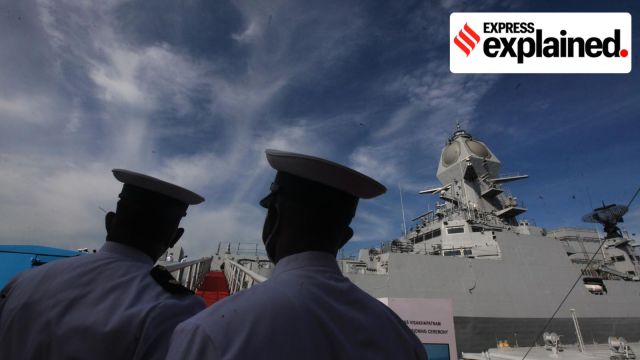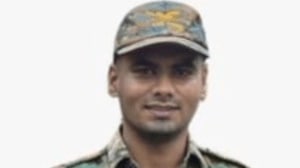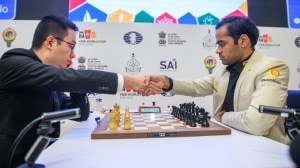In June 2018, a court in Qatar sentenced a Nepalese worker, Anil Chaudhary, to death by a firing squad for murdering a Qatari citizen. Chaudhary, who worked in a car washing firm, was convicted of killing a Qatari national with a khukri. This was Qatar’s first execution in 17 years, the last coming in 2003.

This came as a shock to the Indian government, all the more so as Qatar rarely hands out death sentences. The charges against the Indian nationals were not made public by Qatari authorities.
Story continues below this ad
The background
The Indian nationals are all employees of Doha-based Dahra Global, and were working in their private capacity with Dahra Global to oversee the induction of Italian small stealth submarines U2I2.
Captain Navtej Singh Gill, Captain Birendra Kumar Verma, Captain Saurabh Vasisht, Commander Amit Nagpal, Commander Purnendu Tiwari, Commander Sugunakar Pakala, Commander Sanjeev Gupta and Sailor Ragesh were taken into custody in August 2022.
Charges were also framed against two Qatari nationals, one of whom is Khamis al-Ajmi, CEO of Dahra Global. Al-Ajmi was kept in solitary confinement for a period of two months starting in October 2022 until he was granted bail. An Omani national, who had also been detained, was released just before the beginning of the FIFA Football World Cup.
Deepak Mittal, former Indian Ambassador to Doha, met the detainees thrice during their detention by the authorities. Mittal, who is now in the Prime Minister’s Office, has been tasked with monitoring the case from Delhi.
Story continues below this ad
According to a report in the Financial Times, the eight Indians had been charged with spying for Israel. There was no official word on the charges from the Indian side.
Indians in Qatar
While there are about 90 lakh Indians in the Gulf and West Asian region — of which about 8 lakh live and work in Qatar — the Indian diaspora is generally perceived to be fairly law-abiding.
However, there have been instances of offensive behaviour by the Indians in the past when local authorities have taken action. Some of these cases followed the controversial remarks made about the Prophet by BJP’s Nupur Sharma, and action was taken by some of the countries in the region against the Indians who had supported or amplified those comments. In fact, Qatar was one of the first countries in the region to object to the remarks.
This time, the charges of espionage are grave.
These eight Indians were working at Dahra Global Technologies and Consultancy Services, a defence services provider company owned by an Omani national, who was a retired squadron leader of the Royal Omani Air Force. The company used to provide training, logistics, and maintenance services to the Qatari Emiri Naval Force (QENF). They had been working there for four to six years, and the company was praised by the Indian envoys.
Story continues below this ad
In fact, Commander (retired) Purnendu Tiwari, who served as the Managing Director of the company, was accorded the Pravasi Bharatiya Samman award in 2019 for his role in strengthening bilateral relations between India and Qatar.
The Indian Embassy in Doha was informed about the arrests in mid-September, and on September 30, the men were allowed to speak to their families briefly over telephone.
The legal process
On October 1, 2022, India’s Ambassador in Doha and Deputy Head of Mission met the eight Indians. On October 3, 2022, the first Consular access was granted to the Indian embassy. On March 15, 2023, the last bail plea was rejected.
Then, on March 25, 2023, charges were filed against the eight. On May 30, 2023, Dahra Global closed its operations in Doha. All those working there — primarily Indians — have since returned home. On October 26, Qatar’s court announced its verdict of death sentence against all the eight Indians.
Story continues below this ad
India’s response
In its reaction to the order on October 26, the Ministry of External Affairs said it was attaching “high importance” to this case and is exploring all legal options.
“We are deeply shocked by the verdict of death penalty and are awaiting the detailed judgment. We are in touch with the family members and the legal team, and we are exploring all legal options,” it said.
The statement expressing “shock” signals that Delhi was caught unawares completely by the death sentence. The MEA said it will continue to extend all consular and legal assistance to the Indians. This is in line with India’s standard template response to Indians in distress, irrespective of their nature of offence.
This is not the first time that an Indian faces the death sentence overseas, and the Indian government has always lent its support to free such people. According to figures submitted by the government in 2019, there were 44 Indians on death row, spread across Kuwait, Saudi Arabia and UAE, some over drugs-related offences.
Story continues below this ad
The most famous case in recent times has been that of former Navy officer Kulbhushan Jadhav, on death row in Pakistan’s custody, also on charges of alleged espionage.
Three options
First, the legal process: The case is in what is called ‘The Court of First Instance’. Four hearings have taken place. The Indian government is going to help the Indians challenge the death sentence in higher courts, and seek reprieve from the death penalty.
In contesting the case, Delhi is following the playbook adopted in the Enrica Lexie- Italian Marine case.
On February 15, 2012, two Indian fishermen were killed off the coast of Kerala, India, aboard St. Antony. India alleged that two Italian marines aboard the Italian-flagged commercial oil tanker MB Enrica Lexie killed the fishermen.
Story continues below this ad
Sources said in that case, the Indian government had maintained a stance as per international laws, Maritime Zones Act, 1976, the Indian Penal Code, the Code of Criminal Procedure and provisions of UNCLOS 1982.
Second, the mercy petition: The families have filed a mercy plea with the Emir of Qatar, who is known to give out pardons during Ramadan and Eid. This is also being pursued by the Indian government’s help.
Third, the political and diplomatic options: The matter has been taken up by the Indian government at various official and political levels.
India’s diplomatic efforts will be a test of its multifaceted ties with the tiny but powerful Gulf state, with whom it has worked to build friendly relations.
Story continues below this ad
The then Emir of Qatar, Sheikh Hamad bin Khalifa Al-Thani. [now the Father Emir] had visited India in 1999, 2005 and 2012.In November 2008, the visit of Prime Minister Manmohan Singh to Qatar was the first by an Indian Prime Minister. In March 2015, the Emir of Qatar, Sheikh Tamim bin Hamad Al Thani, paid a State Visit to India. Continuing the momentum, Prime Minister Narendra Modi visited Qatar in June 2016.
In October last year, Modi had spoken with the Emir, accepting his Diwali greetings and had conveyed India’s good wishes for a successful FIFA World Cup tournament scheduled to be held in Qatar. When they spoke on October 29, 2022 and discussed bilateral relations, they agreed to jointly celebrate the 50 years of India-Qatar Diplomatic relations.
Considering Qatar’s newfound heft in international diplomacy developing in the last decade or so – from hosting the Taliban’s global mission in Doha to its current role in securing the release of US hostages from the captivity of Hamas – Delhi will reach out to Doha since both sides have high stakes in strong ties.
The two countries have strong economic ties – LNG imports from Qatar is an important feature of these ties – and the investments by Qatar Investment Authority is substantial in India’s economy.
Story continues below this ad
India’s bilateral trade with Qatar in 2022-23 was US$ 18.77 billion. India’s export to Qatar during 2022-23 was US$ 1.96 billion and India’s import from Qatar was US$ 16.8 billion.
Defence ties with Qatar are also quite strong and defence cooperation is an important pillar of the bilateral agenda.
Sources said that Indian immigrants have a fair amount of goodwill in Qatar. “They are seen as law-abiding, so we will also use the help of influential Indian community members to work the levers in the Qatar establishment,” the sources said.
In this, one of the workarounds could be the transfer of prisoners agreement that was signed in 2015 between India and Qatar.
Challenges
One of the major challenges could be how Delhi negotiates the allegation of spying for Israel. At a time when the region is polarised amid the Israel-Hamas war, India will have a tough task negotiating the geopolitical sensitivities.








































